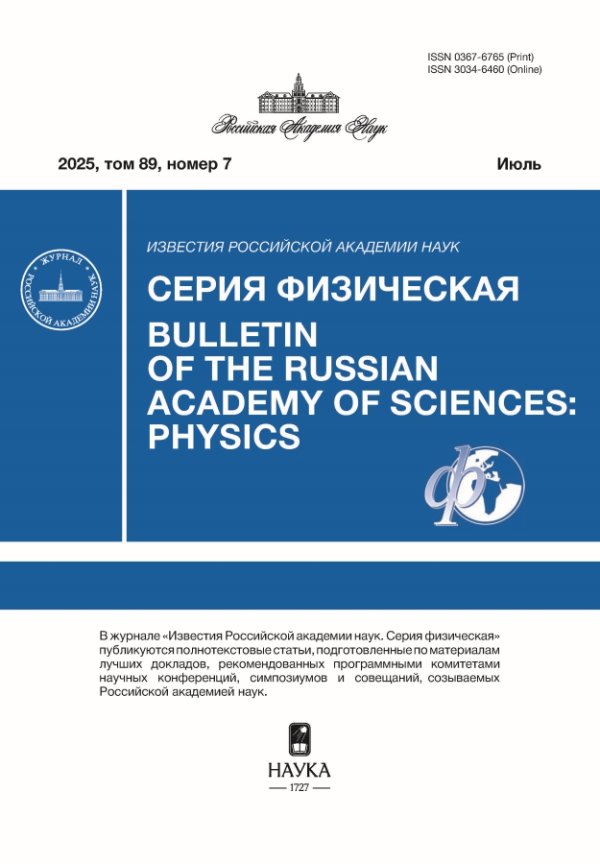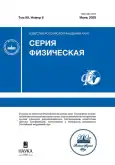ХАРАКТЕРИСТИКИ ФОРБУШ-ПОНИЖЕНИЙ ПО ДАННЫМ ЭКСПЕРИМЕНТА AMS-02 И ПОТОКИ СОЛНЕЧНЫХ КОСМИЧЕСКИХ ЛУЧЕЙ ПО ДАННЫМ GOES-15
- Авторы: Дорошева Д.Н.1,2, Архангельская И.В.2, Борог В.В.2
-
Учреждения:
- Федеральное государственное бюджетное учреждение науки «Институт Земного магнетизма, ионосферы и распространения радиоволн им. Н.В. Пушкова Российской академии наук»
- Федеральное государственное автономное образовательное учреждение высшего образования «Национальный исследовательский ядерный университет «МИФИ»
- Выпуск: Том 89, № 6 (2025)
- Страницы: 984-988
- Раздел: Физика космических лучей
- URL: https://transsyst.ru/0367-6765/article/view/692836
- DOI: https://doi.org/10.31857/S0367676525060299
- ID: 692836
Цитировать
Полный текст
Аннотация
Анализ зависимости амплитуды 10 наиболее сильных форбуш-понижений (ФП), предваряемых КВМ типа Гало, в потоках протонов и ядер гелия по данным AMS-02, от магнитной жесткости частиц показал возможность ее аппроксимации степенной функцией в диапазоне жесткостей от 1 до 10–12 ГВ (как было показано в эксперименте PAMELA). Ее показатель находится в интервале от –0.38±0.02 до –0.68 ±0.04 для протонов и от –0.41±0.03 до –0.79 ±0.04 для ядер гелия. В более широком диапазоне значений жесткостей до 20 ГВ такая аппроксимация обеспечивает уровень значимости 90–92% для протонов и 90–96% для ядер гелия. На всем диапазоне жесткостей следует использовать экспоненциальные функции (95–99% уровень значимости как для протонов, так и для ядер гелия). Результаты сравнения временных рядов для протонов по данным AMS-02 и GOES-15 показывают, что наблюдаются SEP и SPE на фоне ФП.
Ключевые слова
Об авторах
Д. Н. Дорошева
Федеральное государственное бюджетное учреждение науки «Институт Земного магнетизма, ионосферы и распространения радиоволн им. Н.В. Пушкова Российской академии наук»; Федеральное государственное автономное образовательное учреждение высшего образования «Национальный исследовательский ядерный университет «МИФИ»
Email: dorosheva2000@list.ru
Москва, Россия
И. В. Архангельская
Федеральное государственное автономное образовательное учреждение высшего образования «Национальный исследовательский ядерный университет «МИФИ»Москва, Россия
В. В. Борог
Федеральное государственное автономное образовательное учреждение высшего образования «Национальный исследовательский ядерный университет «МИФИ»Москва, Россия
Список литературы
- Дорман Л.И. Вариант галактических космических лучей. М: Московский университет, 1975. 207 с.
- Chen F.F. Introduction to Plasma Physics and Controlled Fusion. Berlin: Springer, 2016. 497 p.
- Nakagawa Y., Nozawa S., and Shinbori A. // Earth. Planets. Space. 2019. V. 71. Art. No. 24.
- Мелкумян А.А., Белов А.В., Абунина М.А. и др. // Изв. РАН. Сер. физ. 2019. Т. 83. № 5. С. 625
- Белов А.В., Белова Е.А., Шлык Н.С. и др. // Геомагн. и аэроном. 2024. № 64. С. 289.
- https://tools.ssdc.asii.it/CosmicRays/ chargedCosmicRays.jsp?&&target=ALL& experiment=AMS-02.
- Лагойда И.А. Характеристики форбуш понижений по данным эксперимента «ПАМЕЛА». Дисс. ... канд. физ.-мат. наук. М.: МИФИ, 2022.
- Лагойда И.A., Воронов С.A., Михайлов В.В. // Физика ЭЧАД. 2019. Т. 50. № 6. С. 1077.
- Wang S., Birdi V., Consolandi C., Claudio Corti et al. // Astrophys. J. 2023. V. 950. P. 23.
- https://cdaw.gsfc.nasa.gov/CME_list/sepe.
- ftp://ftp.ngdc.noaa.gov/STP/SOLAR_DATA/ SATELLITE_ENVIRONMENT/PARTICLES/ 2012.
- https://sepserver.eu/index.php.
- https://www.ngdc.noaa.gov/stp/space-weather/ interplanetary-data/solar-proton-events/SEP%20page%20code.html.
Дополнительные файлы








